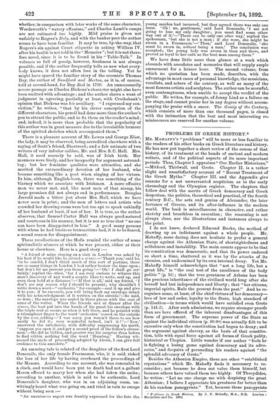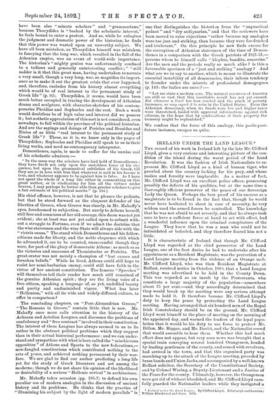PROBLEMS IN GREEK HISTORY.*
Ma. MAHAITY'S "problems" will be more or less familiar to the readers of his other books on Greek literature and history. He has now put together a short review of the course of that history, of its treatment at the bands of ancient and modern writers, and of the political aspects of its more important periods. Thus, Chapter I. appraises " Our Earlier Historians," —Mitford, Thirlwall, and Grote. Chapter II. is a rather slight and unsatisfactory account of " Recent Treatment of the Greek Myths." Chapter III. and the Appendix give reasons for a not unwarranted scepticism as to the early chronology and the Olympian register. The chapters that follow deal with the merits of Greek democracy and Greek despotism, the politics, theoretical and practical, of the fourth century B.C., the acts and genius of Alexander, the later fortunes of Greece, and its after-influence in the modern world. The book is miscellaneous in character, and rather sketchy and breathless in execution ; the reasoning is not always close, nor the illustrations and instances always to the point.
I do not know, declared Edmund Burke, the method of drawing up an indictment against a whole people. Mr. Mahaffy, more daring, does not hesitate to prefer a general charge against the Athenian State, of shortsightedness and selfishness and instability. The main counts appear to be that its constitution was democratic, and that its power endured so short a time, shattered as it was by the attacks of its enemies, and undermined by its own internal decay. Yet Mr. Mahaffy himself acknowledges that "not a long life, but a great life," is "the real test of the excellence of the body politic " (p. 16) ; that the true greatness of Athens has been the precious inheritance of the civilised world long after she herself had lost independence and liberty ; that "her citizens, imperial spirits, Rule the present from the past." And he re- cognises some, at least, of the chief virtues of her democracy— love of law and order, loyalty to the State, high standard of civilisation—in terms which would have satisfied even Grote (p. 141-2). After such admissions, we require stronger proofs than are here offered of the inherent disadvantages of this form of government. The supreme power of the State as against the individual citizen (p. 89-90) was actually felt to be excessive only when the constitution had begun to decay ; and the argument against slavery, as the basis of that constitu- tion, tells with equal force against all forms of Greek polity, historical or Utopian. Little wonder if our author "feels he is fighting a losing game against democracy and its advo- cates," and despairs of persuading his readers against "the splendid advocacy of Grote."
Besides the Athenian Empire, there are other " established reputations" which Mr. Mahaffy finds it necessary to re- ,consider ; not because he does not value them himself, but because others have valued them too highly. Of Thucydides, he writes : "Let no one charge me with despising the great Athenian ; I believe I appreciate his greatness far better than do his random panegyrists." Yet, because these panegyrists
• Problems in Greek History. By J. P. Mahaffy, MA., D.D. London Macmillan and Co. 1892.
have been also " minute scholars " and " grammarians," because Thucydides is " backed by the scholastic interest," he feels bound to enter a protest. And so, while he eulogises the judgment and dramatic power of the historian, he finds that this power was wasted upon an unworthy subject. We have all been mistaken, as Thucydides himself was mistaken, in fancying that the long war, which resulted in the fall of the Athenian empire, was an event of world-wide importance. The historian's " mighty genius was unfortunately confined to a tedious and generally uninteresting conflict ; " " still sadder is it that this great man, having undertaken to narrate a very small, though a very long, war, so magnifies its import- ance as to make it out the greatest crisis that ever happened, and, therefore, excludes from his history almost everything which would be of real interest to the permanent study of Greek life" (p. 92). Thucydides, it seems, would have been much better occupied in tracing the development of Athenian drama and sculpture, with character-sketches of his contem- poraries Pheidias and Sophocles and the rest. Such a work would doubtless be of high value and interest did we possess it ; but aesthetic appreciation of this sort is not considered, even nowadays, to fall within the province of the political historian. And are the sayings and doings of Pericles and Brasidas and Nicias of so little " real interest to the permanent study of Greek life " ? These, as it is, we know only in the pages of Thucydides; Sophocles and Pheidias still speak to us in their living works, and need no contemporary interpreter.
Demosthenes, again, is made to suffer for the unwise zeal of his scholastic admirers :-
" In the same way the scholars have laid hold of Demosthenes ; they have dwelt not only upon the matchless force of his elo- quence, but upon the grammatical subtleties of his Greek, till they are so in love with him that whatever is said in his favour is true, and whatever appears to be against him is false. As I have not spent the whole of a long life either in commenting on this great author, or in vindicating for him all the virtues under heaven, I may perhaps be better able than greater scholars to give a fair estimate of his political merits." (p. 134.)
His chief offence, however, is not that he pleases the pedants, but that he stood forward as the eloquent defender of the liberties of Greece, when Greece was clearly, in Mr. Mahaffy's eyes, foredoomed to subjection. But surely to Athens herself, still free and conscious of her old courage, this doom was not yet evident; she at least was not yet called upon to submit with- out a struggle to Fortune, even if we admit the doctrine that the wise statesman and the wise State will always side with the " victrix cause." The stand which Demosthenes and his fellow- citizens made for liberty, and the noble eloquence with which he advocated it, are to be counted, unsuccessful though they were, for part of the glory of democratic Athens : as much so as the victories and successes of Themistocles or Pericles. The great orator was not merely a champion of " lost causes and forsaken beliefs." While he lived, Athens could still hope to resist her semi-barbarian enemy, could still have faith in the
virtue of her ancient constitution. The famous " Speeches" will themselves tell their reader how much still remained of
the genuine Athenian spirit ; they are the living voice of a free citizen, speaking a language of, as yet, undefiled beauty and purity and undiminished vigour. What has later
"Hellenism," with all its wide and widely-diffused culture, to offer in comparison P
The concluding chapters, on " Post-Alexandrian Greece," " The Romans in Greece," contain little that is new. Mr.
Mahe-fry once more calls attention to the history of the Achaean and Aetolian Leagues, and discusses the problems of
confederacy and " free contract " involved in their constitution. The interest of these Leagues has always seemed to us to lie rather in the abstract political problems which they suggest
than in their actual historical performance : and we can under-
stand and sympathise with what is here called the " mischievous opposition" of Athens and Sparta to the new federations,— new-fangled constitutions which contributed nothing to the arts of peace, and achieved nothing permanent by their war- fare. We are glad to find our author predicting a long life yet for the study of Greek literature and art among the moderns ; though we do not share his opinion of the likelihood or desirability of a serious " Hellenic revival" in architecture.
Mr. Mahaffy takes occasion (pp. 195-7) to defend his own peculiar use of modern analogies in the discussion of ancient history and its problems. He thinks that the practice of "illumining his subject by the light of modern parallels" is one that distinguishes the historian from the "unpractical pedant " and " dry antiquarian," and that the reviewers have been moved to raise objections "rather because my analogies were too just and striking, than because they were far-fetched and irrelevant." On this principle he now finds excuse for the corruption of Athenian statesmen of the time of Demos- thenes in a comparison with the Greek patriots of 1821.31,— persons whom he himself calls " klephts, bandits, assassins."
Are the men and the periods really so much alike ? is this a favourable specimen of a "just and striking "analogy P And what are we to say to another, which is meant to illustrate the essential instability of all democracies, their inborn tendency to founder under the misrule of professional demagogues (p. 143: the italics are ours)? :—
"Let me state a modern case. The natural resources of America are still so vast that this inevitable result has not yet ensued. But whenever a limit has been reached and the pinch of poverty increases, we may expect it to arise in the United States. Even the Athenian democracy, when its funds were low and higher taxes were threatened, hailed with approval informations against rich citizens, in the hope that by confiscations of their property the treasury might be replenished."
We confess that the force of this analogy, this paulo-post- future instance, escapes us quite.



































 Previous page
Previous page